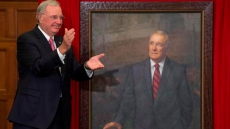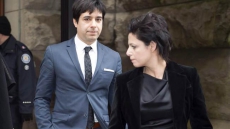OTTAWA — Prime Minister Justin Trudeau will today formally apologize in the House of Commons for a 1914 government decision that barred most of the passengers of the Komagata Maru from entering Canada.
The chartered vessel was carrying 376 Indian passengers, nearly all of them Sikhs, bound for what they thought would be a new life in Canada.
They were hoping to challenge the immigration laws at the time which refused entry to any Indians who had not arrived in Canada via a continuous journey from the home country — nearly impossible at the time.
In moments, I will offer a formal apology on behalf of the Government for the 1914 Komagata Maru incident. Watch: https://t.co/SjTQ7GHMWV
— Justin Trudeau (@JustinTrudeau) May 18, 2016
Canadian officials refused to allow the Indians in, even though they were British subjects just like every other Canadian of the time.
After 20 passengers who had previously lived in Canada were allowed to disembark, the ship was turned away.
Today, Prime Minister Justin Trudeau makes a formal apology in the House of Commons for the Komagata Maru incident. #cdnpoli
— CanadianPM (@CanadianPM) May 18, 2016
It returned to India, where 19 of the passengers were killed in a skirmish with British authorities and dozens of others were imprisoned or forced into hiding.
Trudeau's formal apology is the second from a Canadian prime minister. Former prime minister Stephen Harper delivered an apology in 2008 in British Columbia, not the House of Commons.
Some Indian Canadians saw Harper's move as a slight.

Trudeau promised the Commons apology during the last election campaign.
The B.C. legislature passed its own resolution apologizing in May 2008.
KOMAGATA MARU APOLOGY RESONATES PERSONALLY, POLITICALLY FOR INDO-CANADIANS
OTTAWA — Nimrat Randhawa's family first tried to get into Canada in 1914.
Her great-great grandfather chartered the ship Komagata Maru, filled it with 376 Indian passengers, nearly all of them Sikhs, and they sailed to the shores of British Columbia in search of a new life.
Fast forward more than a century and South Asians are the single largest visible minority community in the country, with Statistics Canada estimating that they will represent one in every three people in the Toronto area alone by 2031.
The community's influence is also reflected in the corridors of power in Ottawa — 23 South Asians, 17 of them Sikh, were elected last fall.
It's expected all will be on hand Wednesday for Prime Minister Justin Trudeau's historic apology for what happened next with the Komagata Maru some 102 years ago.
Canadian officials refused to allow the Indians in, arguing the ship's passengers were violating immigration laws even though they were British subjects just like every other Canadian of the time.

The ship was forced back to India, where 19 were killed in a skirmish with British authorities and dozens of others were imprisoned or forced into hiding, including Randhawa's great-great grandfather.
The family would continue their lives in India, the dream of moving abroad deferred for more than 70 years, until 2003 when — despite their family's history — the Randhawas applied again to enter Canada and were accepted.
Randhawa will be in the public gallery of the Commons on Wednesday to watch the apology — something that she believes will prove that the Canada her family moved to is entirely different from the one that rejected them all those years ago.
"We can say that Canada is a multicultural community," she said, "but when you start to see things like this happen, you realize that it actually is."
Multiculturalism had only just become a buzzword in the 1980s, when Moe Sihota became the first Indo-Canadian elected to the B.C. legislature and began his long, difficult crusade to correct the Komagata Maru injustice.
Sihota's initial efforts were met with ridicule and neglect. It would take until 2008 for the B.C. government to formally apologize, and another eight years for Parliament to follow suit — proof positive, he said, of how diversity can shape politics.
"The face of Canada is somewhat better represented now in our Parliament than years before," said Sihota.

"With that comes a collective understanding, sympathy and appreciation of the significance of these events and the need to apologize for them."
The Conservative government issued an apology of its own, but former prime minister Stephen Harper delivered it in B.C., not in the House of Commons. For Randhawa, it was an important distinction.
The laws that excluded her family were drafted and debated in the House of Commons and so the apology should come from there, she said.
Harper's decision not to apologize in the Commons was seen as a slight by many Indo-Canadians. The Liberal promise to do so was on Randhawa's mind last fall as she prepared to cast a ballot for the first time in a Canadian election.
"It factored in," she said. "It was time to give someone else a chance and see what they would do."
THE EVENTS LEADING UP TO WEDNESDAY'S APOLOGY FOR 1914 KOMAGATA MARU INCIDENT
OTTAWA — On Wednesday, Prime Minister Justin Trudeau will rise in the House of Commons and apologize on behalf of the government of Canada for a decision in 1914 to refuse to allow most of the passengers of the Komagata Maru to land in Canada.

Here is a timeline of some events leading up to the apology:
May 1914: The Japanese steam ship Komagata Maru anchors just outside Vancouver, B.C., with 376 passengers on board — all Indians who were at the time also British subjects. The passengers were seeking to challenge existing immigration laws which refused entry to any Indians who had not arrived in Canada via a continuous journey from the home country — a nearly impossible feat at the time.
June 1914: Twenty passengers who had previously resided in Canada are allowed in, but the rest are required to stay on the ship.
July 1914: After court hearings and clashes with authorities, the ship is finally escorted out of Canadian waters and sets sail for Calcutta, India.
September 1914: Police in India attempt to force the passengers onto trains for Punjab; a riot ensues and 19 people are killed. Others are arrested or go into hiding.

2002: Alliance MP Gurmant Grewal presents a petition in the House of Commons calling on the Liberal government of the day to issue an apology.
2006: Conservative Prime Minister Stephen Harper says he'll consult with Indo-Canadians to determine how to recognize the "sad moment" in Canadian history.
2007: NDP put forward a motion calling on the government to apologize but it's voted down by the Conservatives.

May 2008: Liberal MP Ruby Dhalla, one of the first Sikh women elected to the House of Commons, introduces a similar motion and it passes later that month.
May 2008: The B.C. legislature passes its own resolution apologizing.
August 2008: Prime Minister Stephen Harper gives a speech at a major South Asian festival in B.C. and issues an apology. It's almost immediately rejected by several prominent organizations as it was not presented in the House of Commons.
May 2012: The NDP puts forward a new motion calling for an apology in the House of Commons. The motion is voted down by the Conservatives.

August 2015: Liberal Leader Justin Trudeau repeats 2008 pledge that, if elected, his government would issue a formal apology in the House of Commons.
April 2016: Trudeau announces he will issue the apology in the House of Commons on May 18, 2016.





